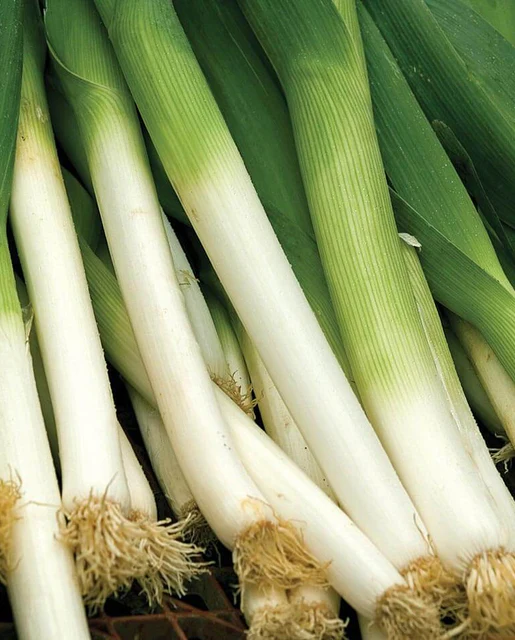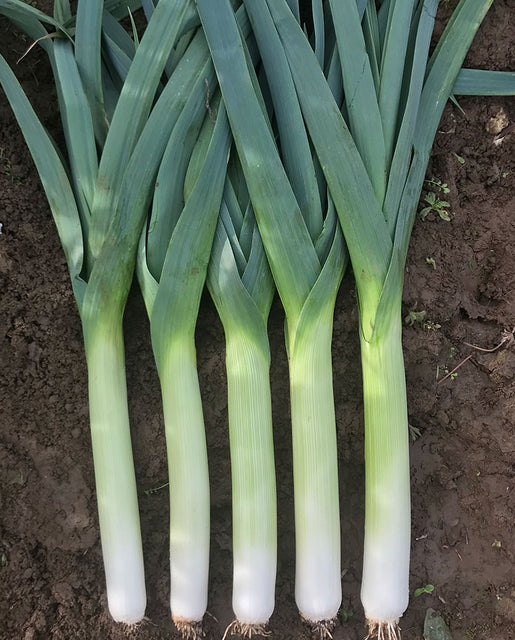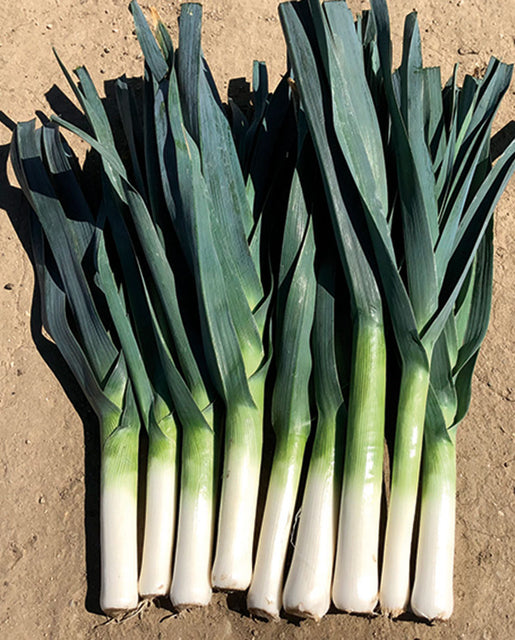For Product Registration and general enquires please contact us

Bandit Coated Organic
$12.99 – $219.99
Bandit is extremely cold hardy and upright in habit. It develops substantial, thickened stems and attractive, very dark blue-green leaves.
Shipping & Returns
West Coast Seeds ships anywhere in North America. However, we are not able to ship garlic, potatoes, asparagus crowns, bulbs, onion sets, Mason bee cocoons, or nematodes outside of Canada. We regret, we cannot accept returns or damages for orders outside of Canada. The minimum shipping charge to the US is $9.99.
Description
More details about Bandit Coated Organic
Bandit Organic leek seeds are CERTIFIED ORGANIC! Sow Bandit leek seeds March to mid-June for fall and winter harvests. Bandit is extremely cold hardy and upright in habit. It develops substantial, thickened stems and attractive, very dark blue-green leaves. The mammoth stems add a little bit of weight for market growers, and can be blanched higher on the plants by hilling. The thickened stems also make cleaning easier. Bandit shows very little bulbing, bolting, or splitting so it can be harvested into the following spring. The flavour is excellent and the sweetness improves with frost and cold weather. These seeds are coated with an inert, organically certified layer which helps to minimize clumping in storage and seed sowing machines. The coating is approved by organic certifiers in Canada, the US, EU, and Japan. Matures in 135 days. (Open-pollinated seeds)-
- Very winter hardy
- Upright growth
- Thick stems show little bulbing
- Open-pollinated seeds
- Matures in 135 days
All About Bandit Coated Organic
Latin
Allium ampeloprasum var. porrum
Family: Amaryllidaceae
Difficulty
Easy, but slow. Transplanting is required.
Season & Zone
Season: Cool season
Exposure: Full-sun
Zone: Winter harvest leeks are hardy to Zone 7.
Timing
Start summer/fall harvest leeks 6-8 weeks before the last frost date, in flats indoors. Start winter harvest leeks indoors from March to mid-June. In mild winter areas, start them in a humus-rich nursery bed outside, and then transplant. Optimal soil temperature: 10-25°C (50-75°F). Seeds should sprout in 10-16 days.
Starting
In flats: Sow seeds 5mm (¼”) deep, about 1cm (½”) apart. Transplant when 20cm (8″) tall. Space 20cm (8″) apart in rows 45cm (18″) apart. Rows can be as narrow as 20cm (8″) if planting in raised beds or other situation where weeding will be simple.
Growing
Ideal pH: 5.-6.5. Leeks have short roots, so the benefit from fertile soil with lots of compost and ½ cup balanced organic fertilizer worked in beneath each 2m (6′) of row. Traditional garden wisdom recommends using a dibber to make holes 15cm (6″) deep. Transplants are then set at the bottom of the hole and the hole is left unfilled – rain will fill it in as the leek grows. To blanch further up the stem, hill soil up around the stem as the leek grows, or mulch with straw.
However, the wise and much loved garden writer Linda Gilkeson asserts that there is no need to plant leeks into holes or trenches. She recommends transplanting the seedlings only at the depth of the soil plug they grow in. They will still produce nice, tall, blanched shanks, with no soil grains between the leaves.
In late fall, mulch around leeks as high up the stems as possible. If the forecast is for weather below -10° (14°Ï‚ cover them with a blanket or tarp.
Days to maturity: From transplant date.
Harvest
Dig at any size, as needed. If winter harvest leeks freeze solid, wait until they thaw out during a warm spell to harvest.
Seed Info
In optimal conditions at least 65% of seeds will germinate. Usual seed life: 1 year. Per 100′ row: 240 seeds, per acre: 70M seeds.
Companion Planting
Grow leeks with beets, carrot, celery, onions, and spinach. Avoid planting near beans and peas. Leeks help repel carrot rust flies.






How to Grow Leeks

Step 1: Timing
Start summer/fall harvest leeks 6-8 weeks before the last frost date, in flats indoors. Start winter harvest leeks indoors from March to mid-June. In mild winter areas, start them in a humus-rich nursery bed outside, and then transplant. Optimal soil temperature: 10-25°C (50-75°F). Seeds should sprout in 10-16 days.
Step 2: Starting
In flats: Sow seeds 5mm (¼”) deep, about 1cm (½”) apart. Transplant when 20cm (8″) tall. Space 20cm (8″) apart in rows 45cm (18″) apart. Rows can be as narrow as 20cm (8″) if planting in raised beds or other situation where weeding will be simple.
Step 3: Growing
Ideal pH: 5.-6.5. Leeks have short roots, so the benefit from fertile soil with lots of compost and ½ cup balanced organic fertilizer worked in beneath each 2m (6′) of row. Traditional garden wisdom recommends using a dibber to make holes 15cm (6″) deep. Transplants are then set at the bottom of the hole and the hole is left unfilled – rain will fill it in as the leek grows. To blanch further up the stem, hill soil up around the stem as the leek grows, or mulch with straw. However, the wise and much loved garden writer Linda Gilkeson asserts that there is no need to plant leeks into holes or trenches. She recommends transplanting the seedlings only at the depth of the soil plug they grow in. They will still produce nice, tall, blanched shanks, with no soil grains between the leaves. In late fall, mulch around leeks as high up the stems as possible. If the forecast is for weather below -10°‚ cover them with a blanket or tarp.
Step 4: Germination
Days to maturity: From transplant date. In optimal conditions at least 65% of seeds will germinate. Usual seed life: 1 year. Per 100′ row: 240 seeds, per acre: 70M seeds.
Step 5: Harvest
Dig at any size, as needed. If winter harvest leeks freeze solid, wait until they thaw out during a warm spell to harvest.
Tips!
Companion Planting: Grow leeks with beets, carrot, celery, onions, and spinach. Avoid planting near beans and peas. Leeks help repel carrot rust flies.Additional information
| Matures | in 135 days |
|---|---|
| Season | Cool season |
| Exposure | Full-sun |
| Quantity | 0.5g, 5g, 25g |
You must be logged in to post a review.










Reviews
There are no reviews yet.